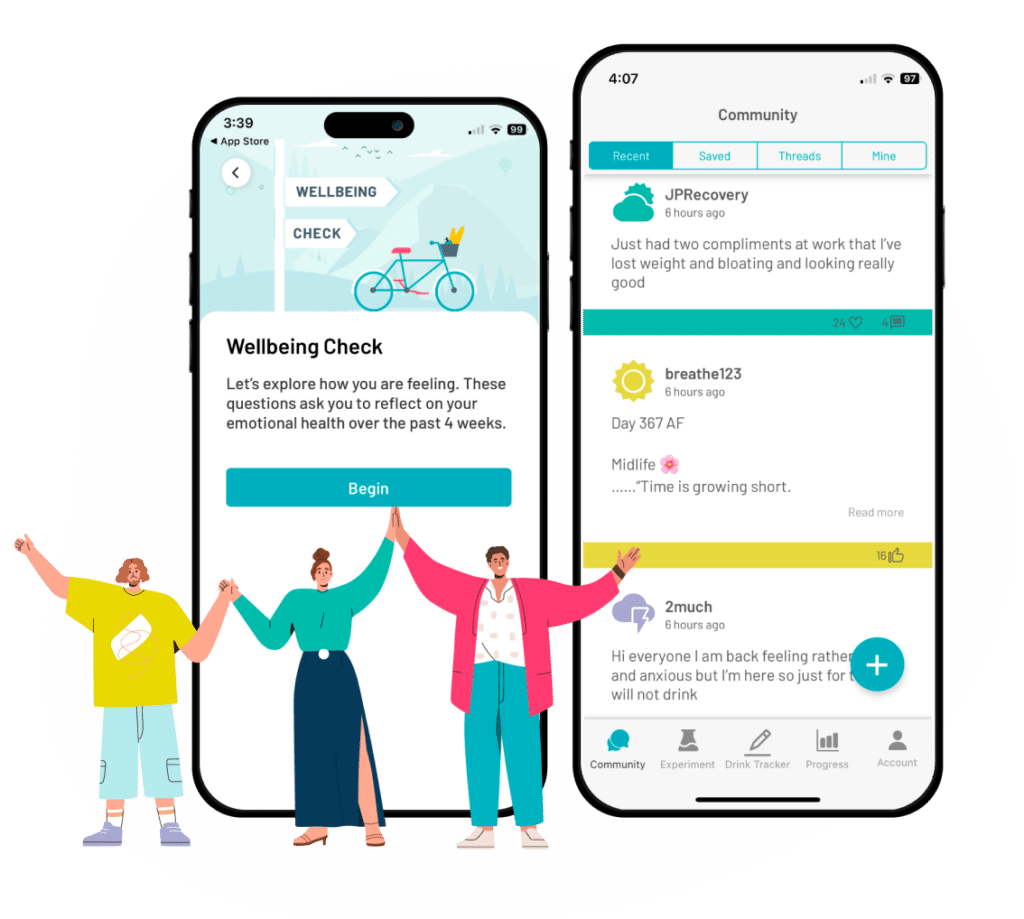
Your relationship with alcohol
If you’re considering a change in your relationship with alcohol, the good news is you’re not alone.
While we live in a society where socialising and celebration usually mean alcohol is also a guest, there’s been a notable rise in cultural movements such as ‘sober curious’ and ‘mindful drinking’. There’s also more alcohol-free drinks available than ever before.
Changing your relationship with alcohol means taking a good look at how alcohol fits into your life right now, and considering the effects it might have on yourself and those around you. Think about your health, relationships, work, finances, and overall well-being. What are the benefits of drinking and what are the costs?
It also involves gauging your drinking patterns, such as how much you drink and how often , and the situations that prompt you to reach for a drink. This reflection also includes understanding your motivations for drinking – whether it’s to relax, socialise, manage stress or other emotions, or if it’s just a part of your normal routine. Whatever your patterns are, just take note of them without judgment.
Changing your relationship with alcohol also means setting personal goals, like cutting back or even breaking up with drinking entirely for a length of time that feels right for you. Try setting short-term goals if the prospect of change is daunting. Experiment with the changes you might make to see how they affect your life, and don’t forget to celebrate your achievements, big or small.
You might also consider seeking the views of trusted friends or family, or the supportive community of Daybreak that will lift you up every step of the way.
Just remember, your relationship with alcohol isn’t set in stone. It can change over time, and it’s important to keep the conversation going with yourself. Ultimately, changing your relationship with alcohol is a process of ongoing self-reflection and making mindful decisions about drinking along the way.
You’ll find lots of information and support at Hello Sunday Morning and via our Daybreak app for whatever journey of change you decide to take.
Cut down or stop: What’s best for me?
If you’re thinking about changing your relationship with alcohol, one of the first decisions to you will make is whether you want to cut back or stop entirely.
In Australia, alcohol is involved in so many aspects of everyday life that for some people, the thought of never having a drink again is so daunting that they end up making no change at all. For others, having alcohol only in particular situations of their choice, feels doable.
So how do you decide what’s best for you?
Understanding moderation vs. abstinence:
Drinking in moderation means you still enjoy a drink, but avoid the harms to health, relationships and wellbeing that potentially come with heavy or risky drinking. On the other hand, abstinence involves not drinking alcohol at all. For some people it’s an easy decision, but for others, weighing up the gains and losses of each option can help.
In deciding what’s right for you, consider the following issues. A self-assessment may help too.
Personal history:
Think about the role alcohol has had in your life. What’s led to your current concerns with drinking? Are you drinking more often or in larger amounts, but still able to control your drinking for the most part? Is moderation something you’d consider, or would you like to stop completely? Have you had severe consequences from drinking such as blackouts or memory loss, physical injuries, social conflicts, or believe you are dependent? If so, you might consider at least a period of abstinence, like 6-12 months, and then reconsider your relationship with alcohol from a different standpoint.
Health:
Assess the impact of alcohol on your physical and mental health. Consider any existing health conditions, medications, or family history of alcohol-related problems that may influence your decision. If you suffer from severe physical effects from alcohol like poor liver function or heart disease, you might consider at least a period of abstinence. Consult with a health professional for personalised advice and guidance.
Social and family life:
What’s the role of alcohol in your social and private life? Do you feel pressure from your social group to drink? Do you drink more or less than other people in your circle? Do social situations influence your drinking patterns, or is your social and or family life influenced by your drinking? The answers may help you decide if abstinence or moderation is the better option for you.
Goals and values:
What do you value? What are your priorities in life? What are you trying to achieve? How does alcohol fit in with these things? Considering the potential benefits and drawbacks of both moderation and abstinence in relation to your values and goals may help you make a decision.
Download the Daybreak app
Join a supportive community of people like you who are taking back the reins of their lives.



Motivation:
Start according to your level of motivation, because we only change what we’re motivated to change. Even if you think you should quit, if that’s going to be hard, it’s better to try to cut back or take a short break first. Motivation is influenced by the benefits you see of reaching the desired goal and the disadvantages you see of taking steps to get there. For example, if you’d like to quit drinking but think that will ruin a social life that’s important to you, you might choose to only drink when you go out and set a limit for yourself on those days. Motivation waxes and wanes, so check in with yourself regularly.
How to choose?
Take time to reflect: Give yourself space and time to reflect on your relationship with alcohol and the personal factors you’ve considered that influence your decision. Journaling, meditating, or discussing your thoughts and feelings with a trusted friend or health professional can help clarify your thoughts and emotions.
Seek support: Hop into Daybreak and learn from other’s experiences. Reach out to people you know will be supportive and who can offer guidance, encouragement, and understanding as you navigate this decision.
Experiment and adapt: Be open to experimenting with different approaches to changing your relationship with alcohol and adjusting your strategy based on your experiences and feedback. Allow yourself the flexibility to change course if your needs, preferences, or circumstances evolve over time.
Practice self-compassion: Be kind and compassionate towards yourself as you explore your options and make decisions about drinking alcohol. Recognise that change is a process that might not go smoothly the whole way.
There is no wrong answer, no one size fits all when it comes to cutting down or quitting. What works for one person is not the same as what works for another. But it’s also not an all or nothing thing. There are lots of options and lots of different supports out there. If at first you don’t succeed, try again with a different approach.
Remember that any break or reduction in drinking is healthy for your body, even if it’s not forever.






I have been abstinent for 75 days. I have been attending an alcohol treatment program and now am transitioning into moderation. It was suggested that I find a support group and a friend of mine who used this a few years ago suggested I try this site. I look forward to seeing/hearing and getting support.